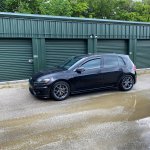aloha_from_bradley
Autocross Champion
- Location
- AZ
Appreciate its subjective. But I can only liken it to a man being sent to buy tamponswith no other understanding of size, brand, effectiveness etc
thats how I feel about trying to pick new rims.
Is there a benefit to having or not having hub rings? I just had to Google what they are
Thanks for your choices
Totally understand. You're asking for actual advice, which I can appreciate.
Most hub rings are plastic. They aren't very sturdy, but do their jobs well. There's always the risk of breaking them or one coming loose, etc. There really isn't a benefit / deficit of having a wheel that requires a hub ring to fit properly, it's just another part that can fail / cause vibration issues if they aren't installed and torqued properly.
If you can, running a wheel with the proper hub bore means you won't need hub rings. It's just one less thing to worry about. The wheel mates to the hub naturally, kinda like sex without a condom.
